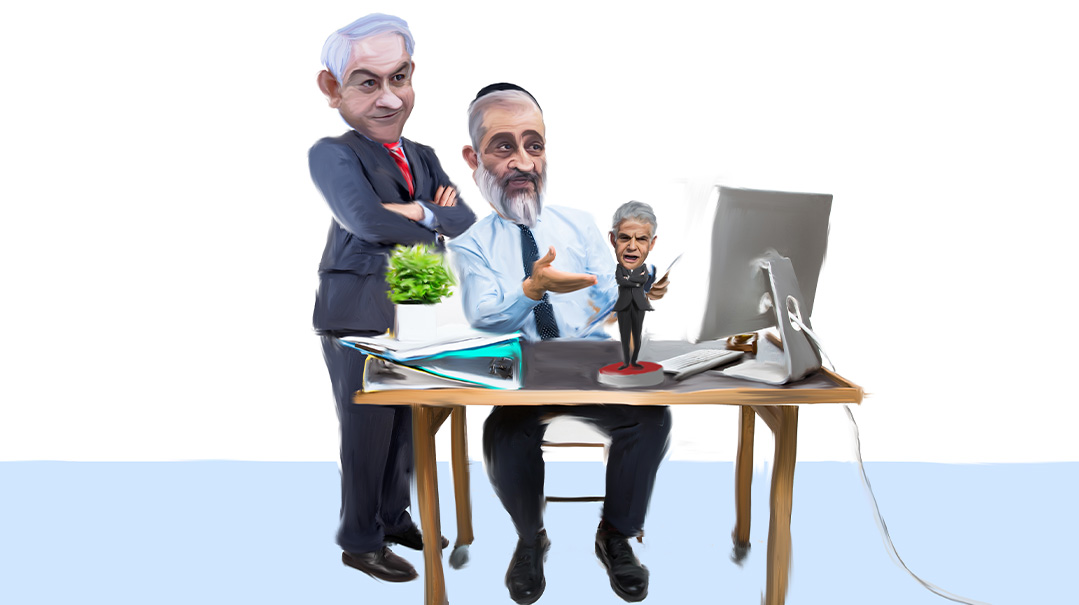The Bibi-Deri Connection

In pursuit of a majority, Bibi and Deri join forces

1.
IT was one of the most expensive connecting flights in history. Former secretary of state Henry Kissinger said famously that “Israel has no foreign policy, only domestic policy,” but this time, the remark could be applied to the American president as well.
En route to Saudi Arabia on a desperate mission to bring down gas prices and rein in inflation, Biden dropped in on Israel. The royal treatment he received in the Holy Land was not replicated by the Saudis, nor did it await him on his return back home. As he met Yair Lapid on the red carpet, Biden could console himself with the reflection that the Israeli prime minister’s polling numbers were even lower than his own 33% approval rating, mere months from the midterm elections.
If the American president had stuck to his original schedule and arrived in June, he would have been greeted on the red carpet — as his host, not as just another dignitary — by then-prime minister Naftali Bennett, whose polling numbers were lower than the US inflation rate.
Biden’s Israeli hosts received the impression that the American president still has his hands on the wheel, but is running on his last drops of fuel. Some were reminded of the way late Israeli prime minister Ariel Sharon staggered on before his collapse. But there was one thing no one disagrees about: The man is a mensch. On the political level, he treated opposition leader Binyamin Netanyahu with respect (“You know I love you,” he was overheard telling Netanyahu as they shook hands), but much more importantly, he behaved the same way in his contacts with ordinary people.
When the president went down on one knee to speak with elderly Holocaust survivors in Yad Vashem, he won Israel’s heart. One chareidi present at the scene was reminded of a similar gesture of respect Biden made earlier in his term to Rivka Ravitz, President Ruvi Rivlin’s chief of staff, upon learning that she was the mother of ten children.
Past experience tells us that American attempts to influence Israeli elections don’t have a very good track record. Netanyahu knows that from personal experience, having defeated Peres in 1996, despite Bill Clinton backing his rival, only to fall short in 2020 despite Trump’s help.
But Biden’s visit did affect the discourse, if only for a brief moment. Israelis were reminded for a day or two of the old American politics, based on decency and respect. In Israel, this type of politics no longer exists, and to judge by the past few years, it would seem to be dying out on the other side of the Atlantic, as well.
2.
Beit Jabotinsky, the tower housing Likud headquarters, a.k.a. Metzudat Ze’ev, located at 38 King George Street in Tel Aviv, will forever be associated with some of the party’s most brilliant victories. It was in the second story of this building that Menachem Begin, Israel’s first prime minister from the party, delivered his victory speech on the night of the revolution of 1977.
During over a decade as prime minister, Netanyahu rarely graced the Likud’s offices in Metzudat Ze’ev with his presence, preferring to hold his meetings in the prime minister’s offices in Jerusalem or in the Kiryah, the Defense Ministry complex in Tel Aviv. Over the past year, his old venues no longer at his disposal, Netanyahu has restored the Likud’s old fortress to its former glory.
In the two weeks since the Knesset dissolved, Metzudat Ze’ev has been greeting a rare chareidi visitor — Shas chairman Aryeh Deri, who, having lost his ministerial post after the last elections, has now also resigned from the Knesset. Netanyahu and Deri have designated the Likud fortress as a joint work space. The purpose of their meetings is clear: to find the formula for election victory and ensure that when it’s all over, they can return to their official bureaus in Jerusalem rather than remain in private party headquarters.
3.
As prime minister, Netanyahu was known for beginning government meetings with a well-worn line. “As an officer in Sayeret Matkal,” he would say, referencing the legendary unit commanded by his brother Yoni, “I learned to never embark on an operation without a contingency plan.”
Netanyahu repeated this gem many times over the years, though at somewhat longer intervals than President Biden repeats his favorite sayings. The Israelis noticed that Biden was repeating the same phrases and anecdotes at intervals of mere minutes, and all this in the briefest of meetings.
But back to Netanyahu: In this election, there’s only one emergency exit — winning 61 seats for the right-wing bloc. In the course of their meetings at Metzudat Ze’ev, Netanyahu and Deri agreed to share their respective parties’ databases of potential supporters, which could serve both parties come election day.
Such close cooperation between two parties targeting the same demographic (traditional Mizrachim) is a rarity in Israeli politics. After four jammed election campaigns, the Start-Up Nation is turning to creative solutions to break the deadlock.
4.
The current election campaign is shaping up to be very different from the previous affairs. In the past, the chareidim were everyone’s punching bag. After a year of chareidi exile on the opposition benches, the realization has sunk in across the political spectrum that in the current constellation, a government without the chareidim is not long for this world.
Over the past few weeks, left-wing parties have seemed desperate to showcase their relationship with the chareidim. The wedding of Gafni’s granddaughter, which attracted the crème de la crème of Israel’s political elite, was addressed in the last column. Since then, Benny Gantz’s merger with Gideon Saar — a longstanding friend of the chareidim — saw chareidi foe Yoaz Hendel being left off the alliance’s list.
And in case the last paragraph sounded like the food chain in Chad Gadya, here’s the bottom line: In this campaign, being on good terms with the chareidim has gone from being a liability to an asset, from a negative to a positive.
The only one who will still seek to exploit hatred of the chareidim for political gain is Avigdor Lieberman, a former ally turned bitter foe of the chareidim. In the past, Lieberman and the chareidim (with an emphasis on Shas) benefited from a symbiotic relationship that involved sparring during the campaign only to share the spoils after the election. Now, after a rupture, which led to Lieberman calling for them to be carted to the dumpster, the chareidi parties have no intention of playing into his hands.
Could the new reality be leveraged to bring a better result? An internal Shas poll showed that a joint run by a potential chareidi-chardal bloc would yield a stunning result of 17 seats. The first to call for a united religious front was the Lubavitcher Rebbe in the previous century. But the Rebbe’s vision won’t be realized this time either.
“I believe that a joint run could bring over 20 seats,” said Shas chairman Deri in an interview with Mishpacha. “But neither side is ready for this. Unity will come, but not today.”
(Originally featured in Mishpacha, Issue 920)
Oops! We could not locate your form.






